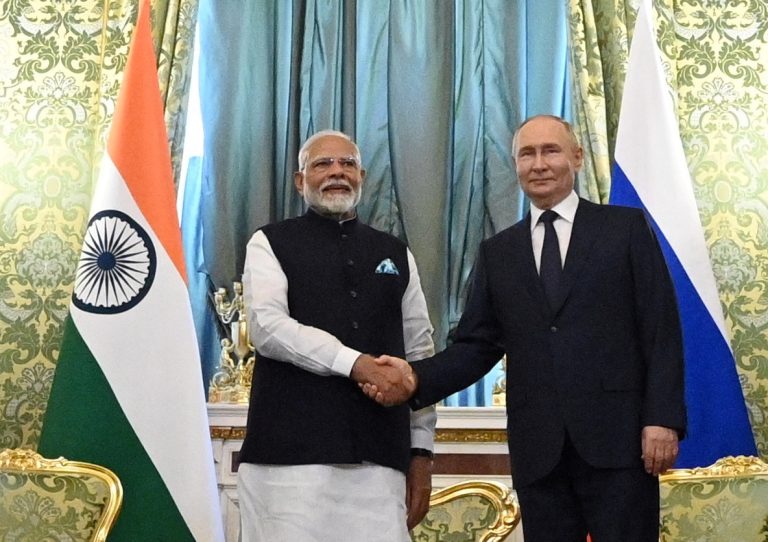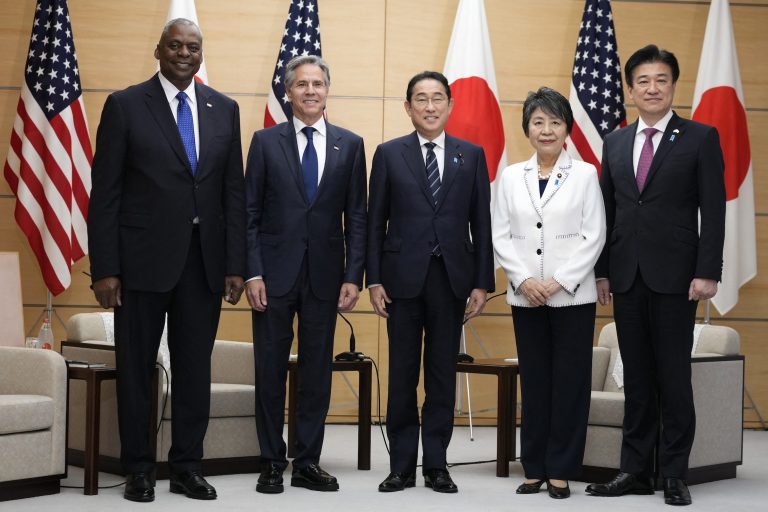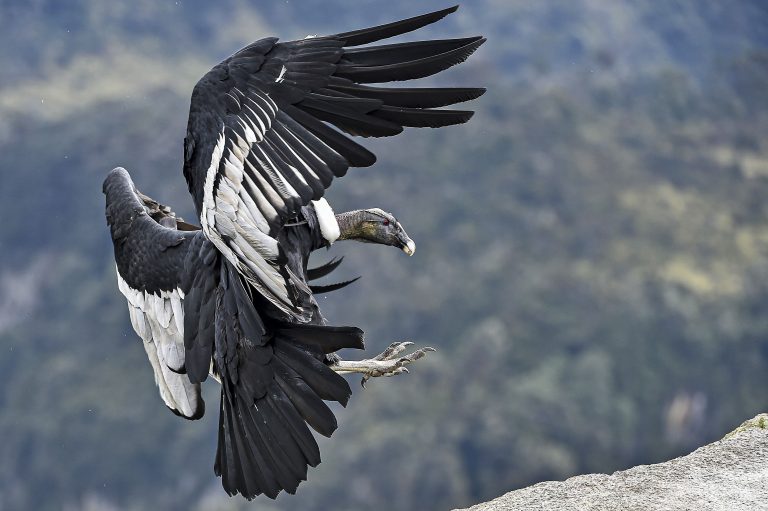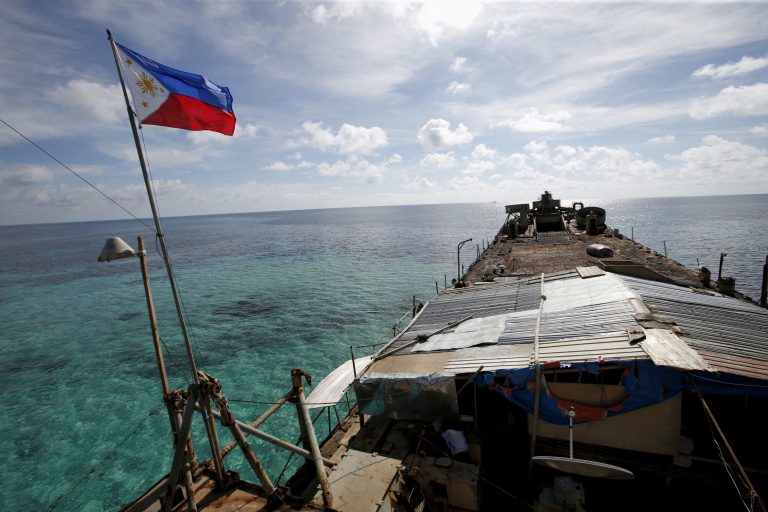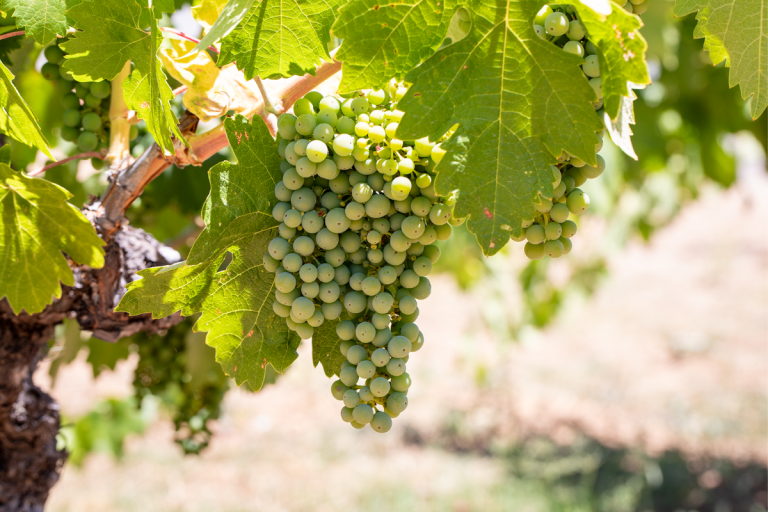In a two-day visit to Moscow, India’s Prime Minister Narenda Modi met with his Russian counterpart, President Vladimir Putin, as the two countries agreed to deepen cooperation in a range of sectors.
Areas of further cooperation include the shipbuilding and nuclear industries, as well as finance as the Kremlin navigates thorny Western sanctions against Russian entities due to the war in Ukraine.
Russian state nuclear corporation Rosatom said it was discussing building six more nuclear power units in India; the Russian Direct Investment Fund (RDIF) inked pharma, shipbuilding and education agreements; and Russia’s second-largest bank spoke of efforts to ease payment flows as bilateral trade between the two nations grows.
Owing to Western sanctions, Russia has pivoted away from European countries to what it calls “friendly” nations such as India and China to diversify and reorient trade flows.
- Ignoring Beijing’s Warnings, US Delegation Visits the Dalai Lama
- Vladimir Putin Visits North Korea in Boost for Growing Alliance
Putin commended Modi for his leadership of the world’s most populous country and his dedication to improving “the lives of the Indian people.”
Success
You are now signed up for our newsletter
Success
Check your email to complete sign up
He bestowed on Modi the Order of St Andrew, Russia’s highest honor.
Modi, for his part, expressed his thanks for Russia’s petroleum and diesel sales to India, which has been “able to save the common man in India” from energy shortages. The prime minister, who was re-elected on June 4, added that the world has had to accept the trade relationship between Russia and India.
The two leaders also discussed possible paths to peace in the Ukraine war, which began in February 2022 when Putin launched an all-out invasion of the country in a bid to prevent Kyiv from developing closer ties with the West and keep it in the Russian sphere.
Modi left Russia on Tuesday, July 9.
A U.S. State Department spokesperson said on Monday, the first day of Modi’s visit, that Washington has “made quite clear directly with India our concerns about their relationship with Russia.”
“We would hope [that] India and any other country when they engage with Russia would make clear that Russia should respect the U.N. Charter, should respect Ukraine’s sovereignty and territorial integrity.”
Expanding ties in industry, energy, finance between Russia and India
Cooperation between Russia and India has gone back decades, with India long relying on military hardware produced by Russia, and before it, the Soviet Union.
Construction of the first two units of India’s Kudankulam Nuclear Power Project, which uses Soviet-designed VVER-1000 reactors, began nearly two decades ago in the southern state of Tamil Nadu as part of a project signed by both countries.
Rosatom and Indian partners were also discussing developing the transit potential of the Northern Sea Route (NSR), which runs from Murmansk near Russia’s border with Norway eastwards to the Bering Strait near Alaska, particularly concerning supplies of Russian oil, coal and liquefied natural gas, Rosatom said.
- Tea in India – An Internationally Recognized Cultural Treasure
- ‘Flawless’: India Celebrates Successful Landing on Moon’s South Pole
Russia hopes the NSR will transport 150 million metric tons in 2030, up from 80 million tons this year.
The RDIF and India’s Enso Group agreed on a partnership for joint investments worth up to 20 billion Russian rubles (US$227 million) in infrastructure development for shipbuilding, Russian agencies reported.
Many Russian companies see huge potential in India, RDIF chief Kirill Dmitriev told reporters on the sidelines of the Putin-Modi meeting. Other deals in education and the pharmaceutical industry were agreed upon, he said.
A major stumbling block to trade has been payment flows. VTB Bank CEO Andrei Kostin said there was constructive dialogue on the issue but acknowledged lingering problems.
“There are, of course, problems linked to sanctions, there are problems related to the incomplete convertibility of the rupee, there are problems related to … a wide range of trade and economic relations, there is unbalanced trade,” Kostin told reporters.
Reuters contributed to this report.



